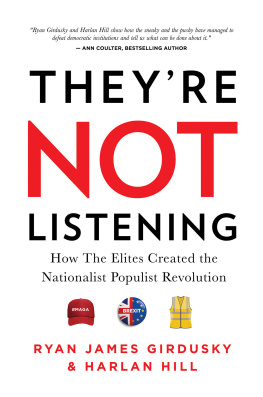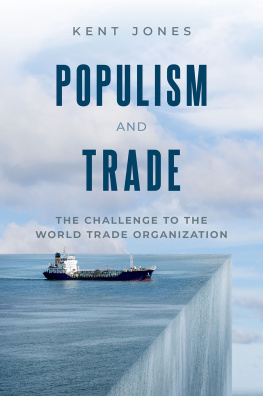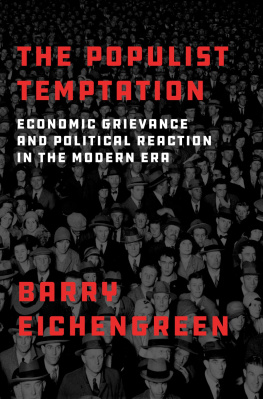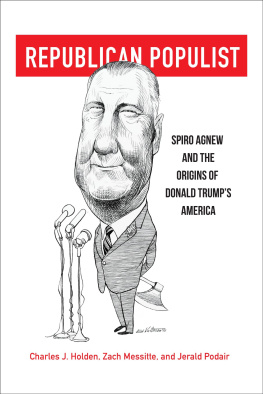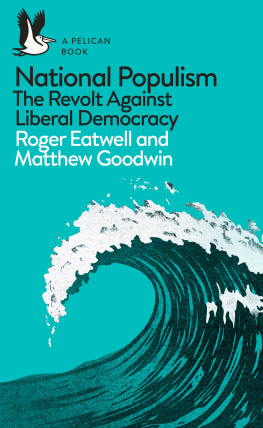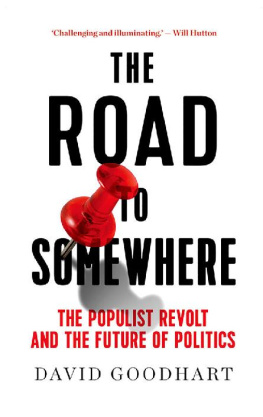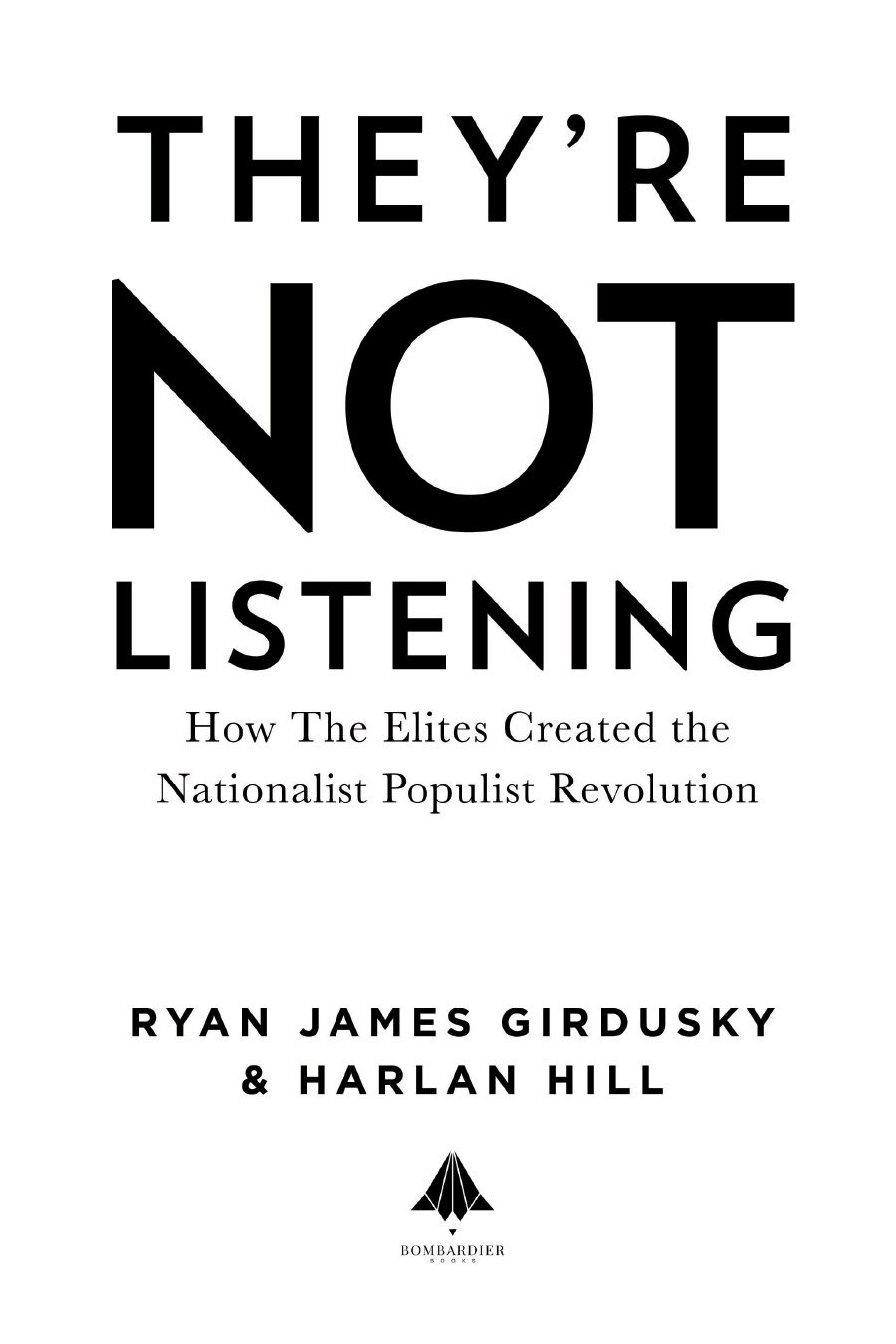Advance Praise for
Theyre Not Listening
No welfare for illegal aliens, no gay marriage, Brexit, Trumpwe vote and we vote and we vote and yet, somehow, we can never win . Feudal subjects had more say in their governance than citizens in todays showpiece democracies. Our bureaucratic-media-judicial rulers treat voters as an irritation to be ignored at their convenience. As disgust with this dysfunctional system reaches a boiling point, Ryan Girdusky and Harlan Hill show how the sneaky and the pushy have managed to defeat democratic institutions and tell us what can be done about it.
Ann Coulter, Author of Thirteen Bestsellers Including
Resistance Is Futile!: How the Trump-Hating Left Lost Its
Collective Mind
Listen up! Ryan James Girdusky and Harlan Hill have written a critically important guide to nationalism-populism here in America and around the world. Devoid of the hysterics, condescension, and bias that permeate elitist media coverage, Girdusky and Hills book delves into the roots of the anti-establishment revolution and its universal principles: preservation of family, law and order, borders, common identity, and national sovereignty. Theyre Not Listening eschews empty fear-mongering for astute analysis of the disruptive political movement that paved the way for Trumpand, God willing, the salvation of the corrupt and crumbling West.
Michelle Malkin, Journalist and Bestselling Writer of
Open Borders Inc.: Whos Funding Americas Destruction?
"In this insightful new book, Ryan Gidursky and Harlan Hill chronicle various populist movements all over the world and the issues that underlie their political strength. Interesting and readable, They're Not Listening contains important lessons for an international political class that seems uninterested or unwilling to come to grips with the political instability that roils their respective countries. Whether you, like me, see the rise of populism as a useful corrective to forty years of bad policies, or wish it would just go away, I suspect you'll learn something from this intelligent, readable overview."
JD Vance, Bestselling Author of Hillbilly Elegy
A BOMBARDIER BOOKS BOOK
An Imprint of Post Hill Press
ISBN: 978-1-64293-499-1
ISBN (eBook): 978-1-64293-500-4
Theyre Not Listening:
How The Elites Created the National Populist Revolution
2020 by Ryan James Girdusky and Harlan Hill
All Rights Reserved
Images and charts designed by and used with permission from Zach Goldberg.
No part of this book may be reproduced, stored in a retrieval system, or transmitted by any means without the written permission of the author and publisher.


Post Hill Press
New York Nashville
posthillpress.com
Published in the United States of America
Table of Contents
In the wake of Donald Trumps victory and the UKs referendum on the European Union, national populism became a political force that has gained traction worldwide. Cosmopolitan elites around the globe never saw this populist uprising coming and few today have bothered to understand why voters have begun to question and reject liberalism, globalism, and the post-Cold War political consensus. Most pundits dismiss it as an illegitimate movement and boil it down to old white reactionaries living in dying towns and elevating strongmen and wannabe fascists.
Outside of the simplistic world of cable news, media pundits, and opinion writers, the reason for the growing tide of national populism is nuanced and complex. One thing is clear: national populism poses an immense threat to the liberal democratic order.
Our current national populist revolt started long before Donald Trump came down his golden escalator or British Prime Minister David Cameron agreed to hold a referendum vote on the EU. Trumps victory and Brexit may have awoken the general public to the rise of national populism, but it has been going on for decades. There are many common misconceptions about national populism, including that its groundswell is isolated to rundown towns in Northern England or the American Midwest. Critics believe that its rise is an overall rejection of the political class spurred solely by demographic changes and that the national populist voting bloc is relegated to just older generations who will soon fade away. None of this is true.
Over the last twenty years, nearly every region of the world, in nations as varied as India, Colombia, Hungary, Poland, Brazil, Japan, Pakistan, and the United States, has seen a rise of national populist ideals, politicians, and political parties.
Modern-day national populism is hard to define in the global sense. Israeli philosopher Yoram Hazony has said that populism and nationalism are two movements that are very different but currently coexist in a single movement in defiance of the elites that are pushing for globalization and the demise of local culture, tribalism, and the nation-state. Nationalism is a movement toward national freedom, while populism is a class conflict.
Nationalism and populism date back to the Roman Republic. The current incarnation has formed as a reaction to various political and social global changes, including mass immigration, identity politics, victimhood culture, crony capitalism, and corruption. British academic Matthew Goodwin states that the rise of populism comes down to the four Ds: distrust of politicians and institutions, destruction of national groups historical identity and established ways of life, deprivation as a result of rising inequalitiesand a loss of faith in a better future, and de-alignment caused by weakening bonds between mainstream parties and institutions.
National populist parties and politicians who have been successful at winning elections have channeled voters frustrations regarding the failures of neoliberalism and addressed the political, economic, and cultural concerns of their nation and people.
Each party and its politicians are as different as the nations they govern or hope to govern. Some are focused on overthrowing corrupt establishment figures and want more of a direct democracy, while others campaign on preserving longstanding ethnic and cultural norms. Theres no exact mold that fits all national populist parties.
While all national populist movements differ on policy, there are some universal principles that overlap globally. Here are nine points that best define what national populists believe:
The nation contains unique and valuable people, culture, and history that are worthy of preservation.
The government exists to protect its citizens. All government policiesespecially on trade, sovereignty, immigration, austerity, and warsshould serve the interests of the people.
Those in the government should live by the same laws of the people they govern.
Economic interests should never benefit the few while displacing the many.
Nation build at home, not abroad.
Law and order are the cornerstones of prosperity.
The media more often than not distort the truth and divide countrymen.

